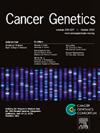25.加强精准肿瘤学:开源知识库整合的价值
IF 1.4
4区 医学
Q4 GENETICS & HEREDITY
引用次数: 0
摘要
精准肿瘤学依赖于先进的测序技术来指导治疗策略,但有效地将基因组数据转化为可操作的见解仍是一项严峻的挑战。不列颠哥伦比亚癌症中心的个性化肿瘤基因组学(POG)计划利用全基因组和转录组分析(WGTA),提供晚期癌症患者肿瘤分子生物学的全面视图,迄今已有超过1200名患者加入该计划。这种分析依赖于将癌症变异及其临床相关性联系起来的临床知识库,但这些知识库的广度和实用性可能会受到访问限制或信息缺失的限制。CIViC(Clinical Interpretation of Variants in Cancer; civicdb.org,癌症变异临床解读;civicdb.org)是一个开放存取、专家主持、群众参与的临床相关癌症变异知识库,旨在解决这些局限性,是用于 POG 变异解读的几个来源之一。基于一组回顾性 POG 病例,我们评估了分子肿瘤委员会(MTB)治疗建议中涉及的基因和变异的知识库覆盖范围,以及基因组分析师提出的建议。我们还考虑了证据质量对 MTB 建议和患者治疗的影响。我们发现 95% 以上的患者有 MTB 认为在临床上可采取行动的变异,这证明了 WGTA 与开源自动变异匹配和报告软件搭配使用的好处。CIViC得出的临床解释占MTB报告的治疗证据的近50%,强调了开放获取知识在精准肿瘤学中的作用。此外,我们还发现基因组特征是一个具有临床影响的关键领域,需要进一步的整理工作和证据模型的开发。本文章由计算机程序翻译,如有差异,请以英文原文为准。
25. Enhancing precision oncology: The value of open-source knowledgebase integration
Precision oncology relies on advanced sequencing technologies to guide treatment strategies, yet effectively translating genomic data into actionable insights remains a critical challenge. The Personalized OncoGenomics (POG) program at BC Cancer utilizes whole genome and transcriptome analysis (WGTA), providing a comprehensive view of the molecular biology of advanced cancer patient tumours, with over 1200 patients enrolled to-date. This analysis relies on curated clinical knowledgebases linking cancer variants and their clinical relevance, but the breadth and utility of these can be limited by access restrictions or missing information. CIViC (Clinical Interpretation of Variants in Cancer; civicdb.org) is an open-access, expert moderated, crowd-sourced knowledgebase of clinically relevant cancer variants that aims to address these limitations and is one of several sources used for variant interpretation in POG. Based on a retrospective cohort of POG cases, we evaluated the knowledgebase coverage of genes and variants involved in treatment recommendations from the molecular tumour board (MTB) as well as those suggested by genome analysts. We also considered the impact of quality of evidence on MTB recommendations and patient treatments. We found more than 95% of patients had an alteration considered clinically actionable by the MTB, demonstrating the benefit of WGTA paired with open-source automated variant matching and reporting software. Clinical interpretations derived from CIViC represented nearly 50% of therapeutic evidence reported at the MTB, emphasizing the role of open-access knowledge in precision oncology. Additionally, we identified genome signatures as a critical area with clinical implications requiring further curation efforts and evidence model development.
求助全文
通过发布文献求助,成功后即可免费获取论文全文。
去求助
来源期刊

Cancer Genetics
ONCOLOGY-GENETICS & HEREDITY
CiteScore
3.20
自引率
5.30%
发文量
167
审稿时长
27 days
期刊介绍:
The aim of Cancer Genetics is to publish high quality scientific papers on the cellular, genetic and molecular aspects of cancer, including cancer predisposition and clinical diagnostic applications. Specific areas of interest include descriptions of new chromosomal, molecular or epigenetic alterations in benign and malignant diseases; novel laboratory approaches for identification and characterization of chromosomal rearrangements or genomic alterations in cancer cells; correlation of genetic changes with pathology and clinical presentation; and the molecular genetics of cancer predisposition. To reach a basic science and clinical multidisciplinary audience, we welcome original full-length articles, reviews, meeting summaries, brief reports, and letters to the editor.
 求助内容:
求助内容: 应助结果提醒方式:
应助结果提醒方式:


